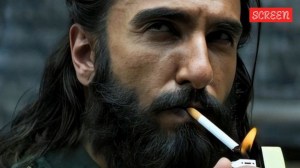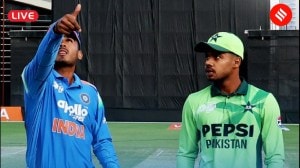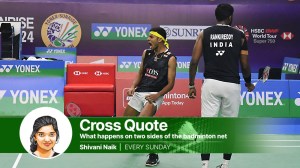Click here to follow Screen Digital on YouTube and stay updated with the latest from the world of cinema.
1 year of Siva-Suriya’s Kanguva: A lesson in misguided spectacle
One year later, Suriya-starrer Kanguva stands as a sobering reminder that ambition without clarity can only end in squandered potential.
 As Kanguva celebrates its first anniversary, we look back at what went wrong with the ambitious period fantasy, starring Suriya in the lead role.
As Kanguva celebrates its first anniversary, we look back at what went wrong with the ambitious period fantasy, starring Suriya in the lead role.The Suriya-starrer Kanguva, director Siva’s unexpected detour into period fantasy disguised as a reincarnation melodrama, turns one year old today. What once arrived with the confidence of an industry-reshaping epic now reads as a case of misplaced ambition, a film so enamored with the scope of its ideas that it forgot to shape them into a compelling narrative.
Tamil cinema wasn’t merely waiting for Kanguva to overturn entrenched biases against Siva, long dismissed for his fondness for campy melodrama and B-movie sensibilities. It was also counting on the film to serve as a timely vehicle for Suriya, a risk-taking superstar poised for a mid-career reinvention. In theory, Kanguva had all the makings of a national spectacle: scale, mythic imagination, a bankable star, and a director hungry for redemption. But the film fell short on every front.
For all its visual splendor and committed production design, the fundamentals of storytelling are conspicuously absent. What remains is a cautionary tale about aiming too high without the necessary grounding, a washed-out, derivative spectacle that mistakes physical scale for imaginative filmmaking.
At the heart of the narrative lies a dual-timeline structure. In the present, Francis Theodore (Suriya), a slacker-bounty hunter, unexpectedly stumbles into memories of his past life as a fearsome warrior after crossing paths with a mute boy fleeing a shadowy organization conducting human-body experiments. The secondary timeline, set in 1070 AD, follows Kanga, a warrior prince (also Suriya), whose vow to protect an orphaned child echoes across rebirths. Conceptually, the idea of a centuries-old promise bridging timelines is rich with potential.
But Kanguva takes this captivating premise and spins it into a dated, overextended yarn that leans heavily on camp instead of confident storytelling. The nonlinear structure feels more like a narrative crutch than a meaningful device. Emotional beats never land, the inner lives of characters remain opaque, and the film rushes through pivotal moments without earning their weight.
Consider the scene in which Kanga volunteers to raise a boy despised by his clan. The film frames the gesture as a moment of profound nobility, yet no emotional groundwork has been laid to justify it. Without context, the act feels hollow, a pattern that repeats across the film as melodramatic moments arrive prepackaged, not built.
Siva aims to portray the hero’s downfall as the tragic consequence of unwavering adherence to a promise and a rigid warrior code. But the writing overindulges in melodrama, treating every narrative beat as if it deserves catharsis. The film assumes its central paasam, devotion, can simply be implied, resorting instead to strained, cringe-inducing attempts to wring emotion from inert scenes. As a result, the supposed emotional anchor of the film never materializes, leaving viewers disengaged.
The present-day portions fare no better. Forced humor and filler scenes involving Francis and his rival bounty hunter (played by Disha Patani) land as stale and grating. Meanwhile, the transition between the two timelines is handled with jarring inelegance, with abrupt cuts serving as the only signposts. The weightless tone of the modern timeline erodes the stately charm of the historical sequences, flattening the film’s tonal range.
Siva’s ambition is most visible in the film’s world-building, the Roman incursions, the warring forest tribes, the elaborate codes of conduct. These elements hint at a deeper, more cohesive mythology. But the film never lingers long enough to let any of it breathe. Instead, the director mistakes loud screams, frenetic fights, and an overbearing soundscape for genuine scale.
Even the casting of Bobby Deol as Udhiran, the one-eyed patriarch seeking vengeance, feels like squandered potential. He is introduced with the promise of a menacing foil, yet is left with almost no material beyond an overdesigned costume. The film never figures out how to use his oily charisma as a meaningful counterweight to Suriya’s stoic heroism.
Ironically, the only duality that truly animates Kanguva is the one between Suriya the performer and Suriya the risk-taker. His stone-faced conviction, the sheer physicality of his performance, and the emotional intensity he invests in a fundamentally flawed film are at times painful to watch. He commits in ways few stars would, carrying the burden of a script that cannot support him.
Yet his efforts are swallowed whole by the film’s relentless sound design. The stilted lines, excessive shouting, and deafening score contribute to an auditory chaos that suffocates even the possibility of nuance. Devi Sri Prasad’s score, meant to elevate the drama, becomes overbearing, often drowning out quiet moments and flattening emotional beats.
The film’s uneven pacing and superficial characterization leave even the more elaborate action set pieces feeling pointless. Suriya may battle a crocodile barehanded, but without narrative stakes, the spectacle becomes hollow. The child character, central to the film’s emotional arc, feels like an afterthought, underwritten, misused, and never integrated meaningfully into Kanga’s eventual fate. The resulting emotional vacuum undermines the film’s themes of connection across time and age.
Also Read | Mohanlal debuted as villain opposite a heartthrob who did 30 movies a year; his fall was equally dramatic
By the third act, the film collapses into a sequel-baiting showdown riddled with logical inconsistencies and hasty narrative leaps.
What remains is a confused muddle, a waste of top-tier technical talent and resources, and perhaps most painfully, a betrayal of its leading man. Suriya gave everything to a project that never deserved the magnitude of his commitment. One year later, Kanguva stands as a sobering reminder that ambition without clarity can only end in squandered potential.
- 01
- 02
- 03
- 04
- 05


































